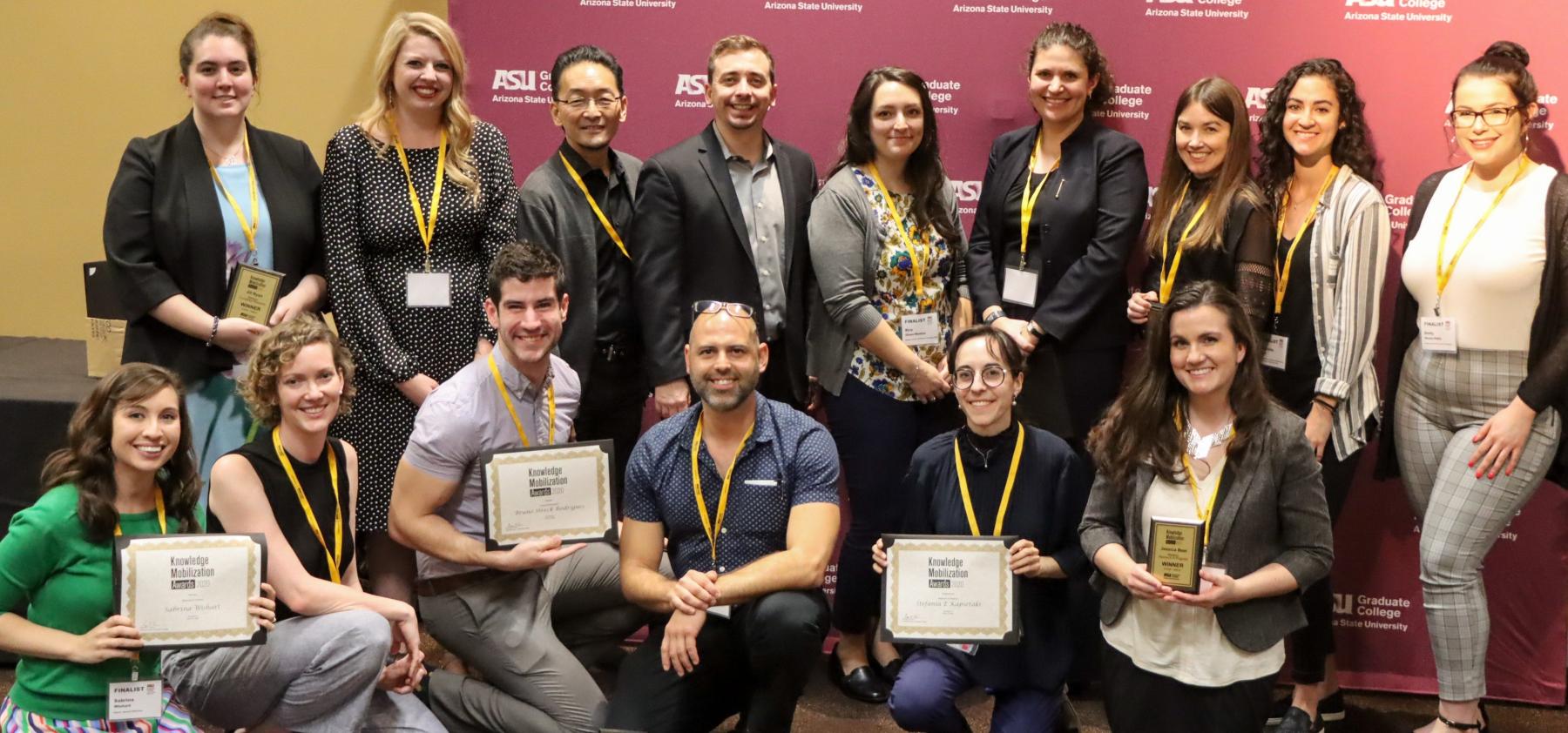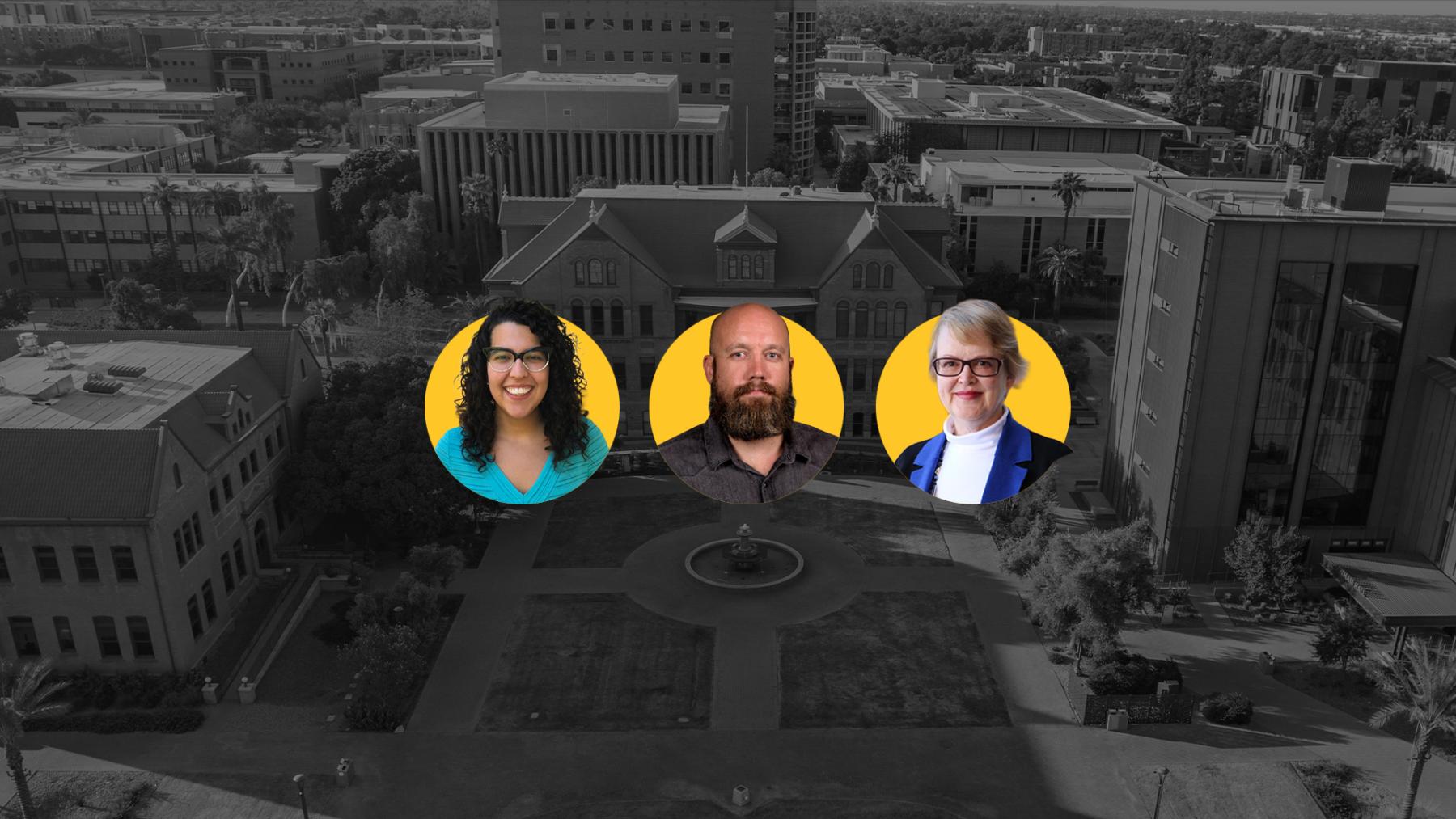
ASU graduate scholars showcase research in action at Knowledge Mobilization Awards
For the fourth year in a row, ASU graduate students and postdoctoral scholars from across all disciplines presented at the Knowledge Mobilization Awards (KMA) ceremony on Wednesday, March 4. The awards are a showcase and celebration of those scholars with research projects that are actively seeking to change current practices and policies in society.
“We are living in an era of unprecedented knowledge production,” said Graduate College Dean Alfredo Artiles, addressing the audience. “[…] A core expectation for scholars today is not only to create and possess knowledge, but also to use it with a demonstratable impact.” The event displayed nineteen research projects that were chosen by a committee of faculty scholars from a consortium of 144 total applications. Finalists at the event were also tasked with presenting 90-second elevator pitches to the audience outlining how their research achieves the KMA criteria:
- Centers on a problem of social significance
- Engages with a group, organization, institution, entity, community or industry
- Increases access to and/or use of research, scholarly or creative works
- And strives to make changes to current practice or policy
The finalists at the event showcased a diverse range of examples of how Knowledge Mobilization is being used across ASU. John Takamura, PhD in Sustainability student for the Julie Ann Wrigley Global Institute of Sustainability, sees Knowledge Mobilization as a means out of poverty with his research linking Native American crafting to sustainable livelihood.
“Indigenous Knowledge Mobilization is social sustainability,” stated Takamura. “[…] They use the knowledge of their resources and their environment and the knowledge of their culture to make beautiful and valuable objects with deep meaning and significance.”
Monetary prizes were granted to one project in each of the six categories for Master’s, Doctoral and Postdoctoral for completed research and research in progress as a means to assist scholars with continuing their practice. Jessica Bear, MBA student with the W. P. Carey School of Business, was the prize recipient for the Master’s Research in Progress category. Her research project, Chain Breaker, is a walking exhibit that is designed to create awareness for consumers regarding the issues of human trafficking that exist in the supply chain business in an effort to help consumers make more informed purchases on everyday goods from produce to technology.
“I had an epiphany that as awful as traffickers are, they are largely opportunistic,” said Bear. “They wouldn’t be doing what they’d be doing if there wasn’t a great deal of money behind it.” Bear also aims to become a supply chain manager with her MBA to effect change at a higher level. “When scholarly and creative works are shared with the community, it endows the individual’s ideas to make lasting change,” Bear continues.
A full list of KMA award winners is listed below and for more information on Knowledge Mobilization initiatives, click here.
Doctoral: Completed Research | Erica Glenn | Conducting (School of Music, Herberger Institute for Design and the Arts) | Eurhythmics as a New Therapy for Russian Orphans with Reactive Attachment Disorder |
Doctoral: Research in Progress | Gabrielle Lout | Human and Social Dimensions of Science and Technology (School for the Future of Innovation in Society) | Swimming Towards Sustainability: Integrating Social Responsibility Into Guyana’s Green Economy |
Masters: Completed Research | Agya Aning, Megan Lupo & Jill Ryan | Investigative Journalism (Walter Cronkite School of Journalism and Mass Communication) | Shelter Crisis |
Masters: Research in Progress | Jessica Bear | MBA (W. P. Carey School of Business) | Chain Breaker |
Postdoctoral: Completed Research | Victoria Theisen-Homer | School of Social Transformation (The College) | Learning to Connect: Relationships, Race, and Teacher Residencies |
Postdoctoral: Research in Progress | Matthew Emery | School of Human Evolution and Social Change (The College) | Assessing DNA Degradation in Thermally Altered Human Bones and Teeth Using Ancient and Forensic DNA Analysis |
More stories from the Graduate Insider

Graduate education is an adventure
About eighteen months ago, I set out on a journey walking the islands of the Dodecanese during a sailing trip in Türkiye and Greece with several friends. Along the way, I found winding paths, timeless villages and breathtaking views of sea and sky. That experience got me thinking about how adventure shows up in other parts of life, especially in learning.

From practice to presentation: How to deliver a winning faculty job talk
Giving a job talk can feel like the most high-stakes presentation of your academic job search. It’s not just a research seminar—it’s your opportunity to demonstrate vision, communication skills, and fit within a department. In a recent Lunch and Learn, faculty members Associate Professor in School of International Letters and Cultures, Anita Huizar-Hernandez, Professor in School of Life Sciences Jeffrey Jensen, and Professor in Department of Physics Patricia Rankin shared concrete strategies to help graduate students and postdocs succeed as future faculty candidates.

Mentoring matters: Mentoring students through impostor syndrome
Graduate education can be an exhilarating journey — but for many students, it also brings moments of self-doubt and uncertainty. In our recent Mentoring Matters panel, “Mentoring Students Through Impostor Syndrome,” Graduate College Senior Associate Dean Dr. Lisa Anderson sat down with Dr. Rebecca Wachs, Associate Professor in the School of Biological and Health Systems Engineering, and Dr.